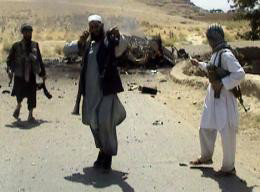Associated Press, January 3, 2009
“Talibanization” grows near capital
Militant group gains more control in Afghanistan
By Jason Straziuso and Amir Shah

Television footage from June shows Afghan militants holding weapons next to a wrecked vehicle in Wardak province in Afghanistan. The militants have taken over many parts of the area. Photo: APTN ASSOCIATED PRESS
Two months ago, Mohammad Anwar recalls, the Taliban paraded accused thieves through his village, tarred their faces with oil and threw them in jail.
The public punishment was a clear sign to villagers that the Taliban are now in charge. And the province they took over lies just 30 miles from the Afghan capital of Kabul, right on the main highway.
The Taliban has long operated its own shadow government in the most dangerous parts of Afghanistan, but its power is now spreading north to the doorstep of Kabul, according to Associated Press interviews with a dozen government officials, analysts, Taliban commanders and Afghan villagers. More than seven years after the U.S.-led invasion, the Islamic militia is attempting — at least in name — to reconstitute the government by which it ruled Afghanistan in the late 1990s.
Over the past year in Wardak province alone, Taliban fighters have taken over district centers, set up checkpoints on rural highways and captured Afghan soldiers. The Taliban in Wardak has its own governor and military chief, its own pseudo-court system and its own religious leaders who act as judges. Bands of armed militants in beat-up trucks cruise the countryside, dispensing their own justice against accused spies and thieves.
More troops on the way
"After night falls, no police drive through here," the 20-year-old Anwar said, urging an AP journalist to return to Kabul before the militants drove into view.
Two miles down the road, a policeman named Fawad manned a checkpoint, wearing the traditional shalwar kameez robe so he could pretend to be a simple villager in case of a Taliban attack.
"There are more and more Taliban this year," said Fawad, who like many Afghans goes by only one name. "The people of the villages are not going to the government courts. The Taliban are warning them that no one can go there."
The increasing "Talibanization" is taking place in areas of countryside where the U.S., NATO and government of Hamid Karzai don't have enough troops for a permanent presence. Recognizing this, the U.S. plans to send an influx of troops in January into Wardak and Logar, right next to Kabul. Between 20,000 and 30,000 new American forces are scheduled to arrive by the summer.
Some Western officials argue that the rise of a shadow government is nothing more than the return of different emboldened warlords. They suspect militants simply stepped in where they saw a void in areas not reached by the Karzai's government, and it is still not clear if they have a coherent strategy. U.S. Gen. David McKiernan, the top NATO commander in Afghanistan, has noted deep fault lines between insurgent groups.
McKiernan said the Taliban is trying not to govern but to intimidate.
In some cases they do try to have shadow governors or court systems, McKiernan said, "but they certainly do not bring with them any incentives to a community, any socio-economic programs, any perks, if you will."
Far-reaching effects
It's not clear just how far the shadow government goes. Taliban officials and analysts boast that there are now Taliban shadow governors in almost every Afghan province.
"Three years ago the Taliban had no control in Afghanistan. They were spread too thin. Now they have power. They have soldiers. They have governors, district chiefs and judges. It is a very big difference from what you saw in 2003 or even 2005," said Abdul Salam Zaeef, the Taliban's former ambassador to Pakistan.
The Afghanistan NGO Safety Office, which provides safety information to aid organizations operating in the country, said that by a conservative estimate, anti-government militants operate in more than 35 percent of the country, and that the number is growing.
...
In the absence of effective local governance, the militants have been arresting criminals, providing courts, dispensing justice, running prisons and organising public executions - all within an hour's drive of Kabul.
An hour's drive south of Kabul in Logar, the Taliban took over the district of Baraki Barak just before the start of the Muslim holy month of Ramadan in September. They rented shops and armed men wandered the streets, residents say.
They ordered barbers with TV sets to throw them away and kicked the satellite dishes on some houses to the ground.
After Friday prayers on the 25th day of Ramadan, Taliban fighters announced they were going to implement sharia law by their conservative and punitive reading of Islam. They warned that anyone working for the government would be considered a spy and killed.
"Everyone with links to the government fled the area," said a shopkeeper in Baraki Barak who spoke only on condition he wasn't identified for fear of the Taliban. "The people are very afraid of the Taliban, but if anyone shows any kind of reaction, the Taliban will mark that man and say, 'You are a spy of the foreigners and infidels.'"
Characters Count: 6271
